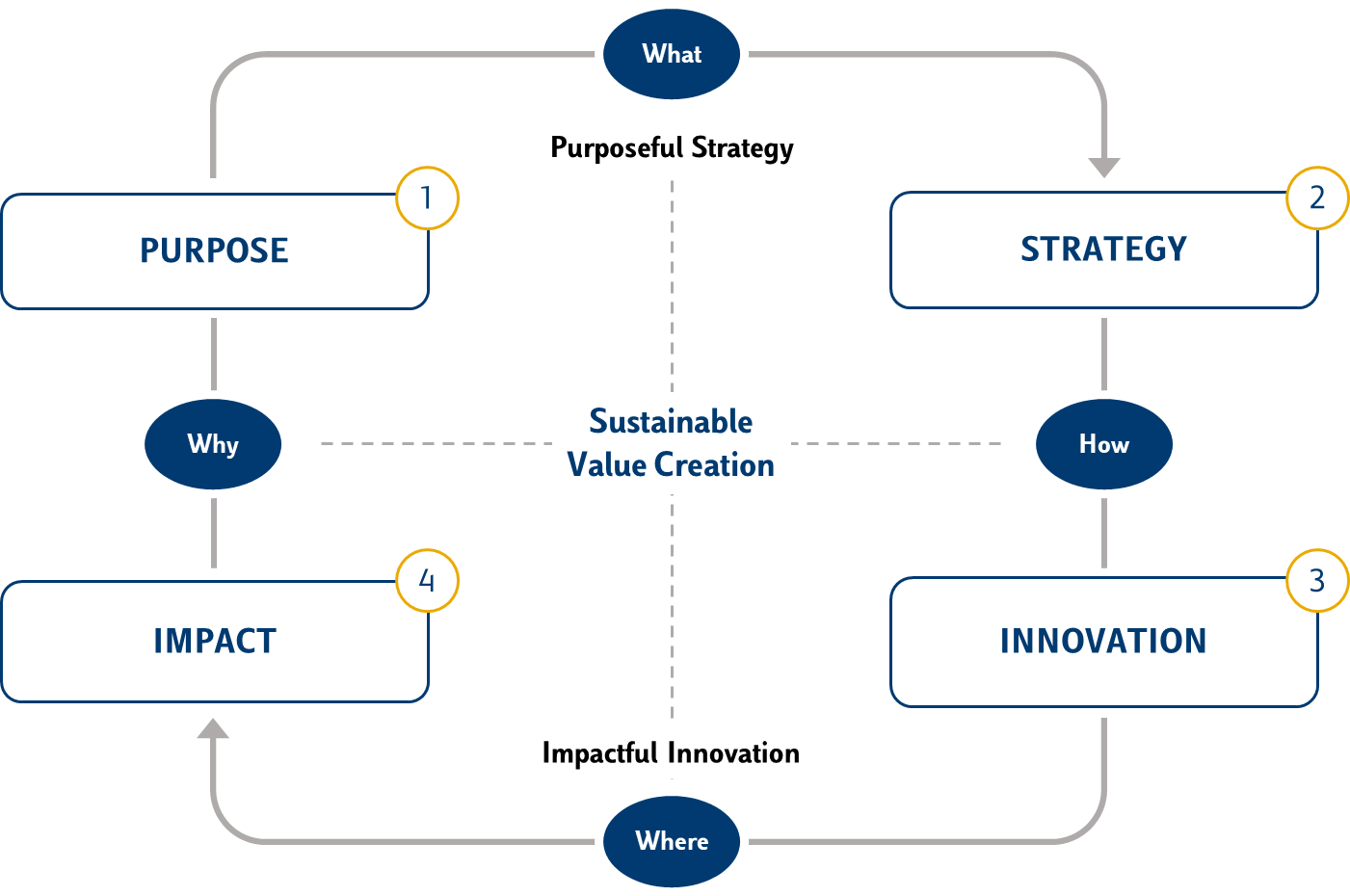Purpose to Impact
Purpose to Impact Model
The objective of Luiss Business School is to transform the learning experience in the higher-education industry in order to generate value and create a positive societal impact.
To achieve its Vision and Mission, Luiss Business School relies upon a structured approach toward the implementation of its Strategic Plan 2025-2028. This approach guides the School in its pursuit of Sustainable Value Creation, a long-term perspective that maximises the institution’s impact. The School’s action plan is consistent with the Purpose to Impact Model, which consists of four distinct yet intertwined key elements: Purpose (“Why”), Strategy (“What”), Innovation (“How”), and Impact (“Where”). On the one hand, Purpose and Strategy are anchored in the process of identification and execution of a Purposeful Strategy (which corresponds to the School’s Strategic Plan), whereas on the other hand, Innovation and Impact are rooted in the search for Impactful Innovation.
Luiss Business School’s Purpose is summarised in its mission statement, which captures its aspiration to effectively contribute to society. Multiplicity and diversity are valuable inputs in this process, as the organisation deals with different partners that demand value creation be achieved and shared through the organisation’s outputs and outcomes. The School’s corporate purpose (to be impactful) inevitably affects the ties among its internal and external stakeholders. In this regard, Luiss Business School aims to produce a positive societal impact by educating “leaders for a better world”.

Benefit Corporation and Path to B-Corp
The School has set five key objectives to be pursued in line with its mission, vision and values:
- Value inclusion and diversity
- Teaching and research focused on sustainability and societal impact
- Development and advancement of communities
- Environmental protection and territorial impact
- People & Culture
The Benefit Corporation status reinforces Luiss Business School’s ability to create an impact, and strengthens its ability to engage with stakeholders and communities. Each objective is closely linked to a specific set of actions put in place by the School to fulfil its mission and vision, and promote its values.
The School’s Roots – A relational Hub
Corporate Connections
A close collaboration with the business community is one of Luiss BS’ strong advantages in achieving its strategic objectives, and the School’s interconnection with the business community is deeply embedded in the institutional characteristics of the School. The institutional link with Confindustria (the Confederation of the Companies operating in Italy) makes the School’s interaction with the corporate world a trait of daily life, guaranteeing a privileged access to the Italian business community.
Indeed, corporate relations permeate all activities at the School, starting with governance, and interaction with companies also plays a key role in programme design, developing and hosting events for students and professionals, exposing faculty to business needs, opportunities for consultancy activities, and engaging in executive education.
Participation to International Accreditation Associations and Networks
Luiss Business School considers participation in international accreditation processes essential for its continuous improvement. As international standards drive the School to pursue increasingly ambitious goals, Luiss Business School is actively engaged in several networks. In addition to AMBA, AACSB, and EFMD-EQUIS, the School is accredited and recognised by key national bodies such as ASFOR and Regione Lazio. It also holds ISO 9011 and Project Management Institute certifications.
Beyond AMBA, Luiss Business School is a member of various networks that actively promote the principles of social and environmental responsibility, including Next (Nuova Economia X Tutti), ASFOR, EFMD, AACSB, GBSN, and IIRC. The School recognises the value of international networks in advancing responsible management education globally. As such, it is a signatory member of the Project Management Institute (PMI), the Globally Responsible Leadership Initiative (GRLI), the Principles for Responsible Management Education (PRME), an initiative of the United Nations Global Compact, the European Research Centre for Information Systems (ERCIS), and the European Association for International Education (EAIE).
International Alliance
The School’s international dimension is a direct expression of its strategic vision, reflecting its core values and long-term ambitions. A key objective is to contribute meaningfully to the higher education landscape by enhancing the international component of education and setting clear priorities and outcomes to build a high-impact learning platform. At the heart of this vision lies a “coopetitive” approach, whereby Luiss BS engages in collaborative initiatives with leading academic institutions to foster continuous innovation in education.
A tangible expression of this commitment is the School’s membership, since 2021, in the Future of Management Education Alliance (FOME). Comprising 13 of the world’s most prestigious business schools (BI Norwegian Business School, EDHEC, Esade Business School, ESMT Berlin, HKUST, Imperial College Business School, Ivey Business School, Johns Hopkins Carey Business School, Luiss Business School, Rotterdam School of Management, SMU, The University of Melbourne, Vlerick Business School), FOME enables Luiss BS to pioneer digital transformation, enhance online learning, and create cutting-edge, collaborative educational experiences.